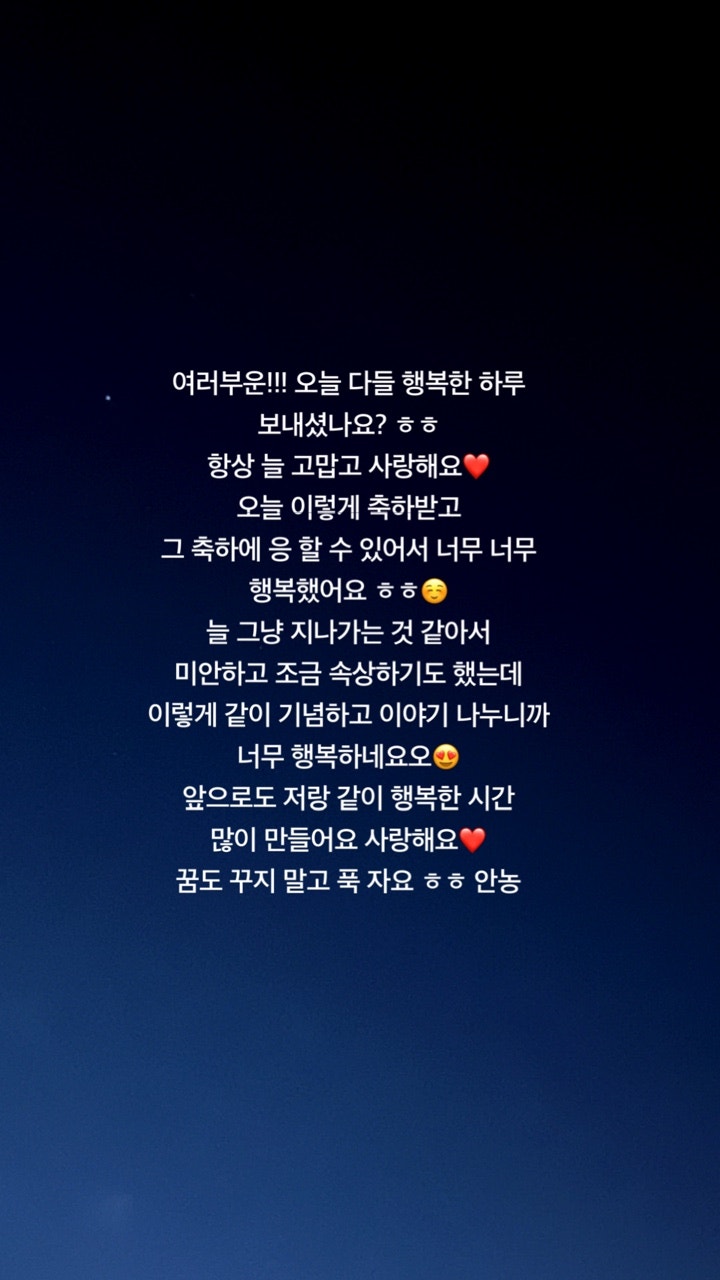너무 너무 사랑해요
사랑은 우리의 삶에서 가장 특별하고 아름다운 감정 중 하나입니다. 사랑은 우리의 마음을 따뜻하게 만들어주고, 우리를 행복하게 만들어줍니다. 이렇게 소중한 사랑의 의미와 표현 방법, 그리고 사랑이 우리에게 주는 영향에 대해 알아보겠습니다.
1. 사랑의 의미를 이해하기: 사랑의 정의를 알아봅시다
사랑은 감정적인 연결과 더불어 서로를 배려하고 존중하는 것입니다. 사랑은 서로의 행복과 안녕을 바라는 마음이며, 서로를 위해 희생을 할 수 있는 용기입니다. 사랑은 언어와 문화에 관계없이 모든 사람에게 공유될 수 있는 보편적인 감정입니다.
2. 사랑의 표현 방법: 사랑을 표현하는 다양한 방법
사랑은 다양한 방식으로 표현될 수 있습니다. 말로 표현하는 것은 물론, 행동이나 제스처, 선물, 서비스 등 다양한 방법으로 사랑을 전달할 수 있습니다. 사랑은 상대방을 지지하고 격려하는 것뿐만 아니라, 서로를 이해하고 용서하며, 함께 시간을 보내는 것에도 나타납니다.
3. 나에게 사랑의 의미는?: 나 자신에 대한 사랑의 중요성
우리가 다른 사람들을 사랑하려면 먼저 우리 자신을 사랑해야 합니다. 자신을 사랑하고 존중함으로써 우리는 더 큰 사랑을 나눌 수 있습니다. 나 자신을 사랑하는 것은 우리의 가치를 인정하고 우리 자신에게 자신감을 부여하는 것입니다. 나 자신을 사랑함으로써 우리는 건강하고 행복한 삶을 살 수 있습니다.
4. 사랑과 우정의 관계: 우정과 사랑의 차이와 유사성
사랑과 우정은 서로 비슷하지만 몇 가지 차이점이 있습니다. 사랑은 더욱 깊고 강한 감정이며, 애정과 관심으로 이루어져 있습니다. 반면에 우정은 서로를 신뢰하고 존중하는 감정입니다. 사랑은 로맨틱한 측면을 포함하지만, 우정은 관계의 친밀성과 이해에 초점을 둡니다.
5. 사랑의 언어: 사랑을 전달하는 방식과 표현들
사랑의 언어는 다양합니다. 몇 가지 주요한 방식으로는 말로 표현하는 언어, 육체적인 접촉, 서비스와 행동, 선물 등이 있습니다. 각각의 사람들은 특정한 사랑의 언어를 더 잘 이해하고 소통할 수 있으며, 서로의 언어를 배우고 존중하는 것이 중요합니다.
6. 사랑을 받고 주는 기쁨: 상호 사랑의 주고받기의 중요성
사랑을 받는 것만큼이나 사랑을 주는 것도 큰 기쁨입니다. 상호 사랑의 주고받기는 관계를 향상시키고 연결력을 강화시키는 데 도움이 됩니다. 사랑을 주고 받으면서 마음의 안정과 행복을 경험할 수 있습니다.
7. 사랑이 주는 힘: 사랑이 우리에게 주는 긍정적인 영향
사랑은 우리에게 많은 긍정적인 영향을 줍니다. 사랑은 우리의 심리적, 정서적, 신체적 건강에 도움이 되며, 우리에게 희망과 용기를 주고, 스트레스를 완화시키는 역할을 합니다. 사랑은 우리의 삶에 긍정적인 변화와 행복을 가져다 줍니다.
8. 사랑으로 세상을 바라보는 방법: 사랑으로 변화를 이끌어 내는 사고 방식
사랑은 우리에게 큰 힘을 주며, 우리를 변화시키는 원동력입니다. 사랑으로 세상을 바라보면 더욱 관대하고 이해심 있는 태도를 가질 수 있습니다. 우리가 사랑으로 변화를 이끌어내면 세상은 더욱 평화롭고 상호 이해에 기반한 곳으로 나아갈 수 있습니다.
자주 묻는 질문들(FAQs):
Q: 너무 사랑해요의 발음은 어떻게 하나요? (너무 사랑해요 pronunciation)
A: 너무 사랑해요는 “neo-mu sa-rang-hae-yo”로 발음됩니다.
Q: 너무는 영어로 어떻게 번역되나요? (너무 in English)
A: 너무는 “too” 또는 “very”로 번역됩니다.
Q: 사랑해요는 영어로 어떻게 번역되나요? (사랑해요 translation)
A: 사랑해요는 “I love you”로 번역됩니다.
Q: 너무 사랑해는 영어로 어떻게 번역되나요? (너무 사랑해 translation)
A: 너무 사랑해는 “I love you so much”로 번역됩니다.
Q: 나도 사랑해요는 영어로 어떻게 말하나요? (나도 사랑해요 in english)
A: 나도 사랑해요는 “I love you too”로 말합니다.
Q: 너무의 의미는 무엇인가요? (너무 meaning)
A: 너무는 한국어에서 “아주”, “매우”와 같은 강조의 의미를 가지고 있습니다.
Q: 너무 사랑해요는 무슨 뜻인가요? (너무 사랑해요 l g)
A: 너무 사랑해요는 “I love you so much” 또는 “I love you very much”라는 뜻입니다.
Q: 한국어로 “I love you”는 무엇이죠? (I love you in Korean 너무 너무 사랑해요)
A: 한국어로 “I love you”는 “사랑해요” 또는 “사랑해”라고 표현합니다.
사랑은 우리의 삶에서 가장 소중한 감정 중 하나입니다. 우리는 사랑을 배우고 표현함으로써 더 나은 사회를 만들어 갈 수 있습니다. 사랑은 서로를 이해하고 존중하며, 힘을 실어주는 힘이며, 우리가 가진 가장 아름다운 선물입니다. 너무 너무 사랑해요!
사용자가 검색한 키워드: 너무 너무 사랑해요 너무 사랑해요 pronunciation, 너무 in English, 사랑해요 translation, 너무 사랑해, 나도 사랑해요 in english, 너무 meaning, 너무 사랑해요 l g, I love you in Korean
Categories: Top 65 너무 너무 사랑해요
[MV] Kim Bumsoo(김범수) _ I Love You(사랑해요) (Uncontrollably Fond(함부로 애틋하게) OST Part.9)
무엇은 영어로?
영어는 현대 세계에서 가장 많이 사용되고 있는 국제 언어입니다. 사실, 거의 모든 국가에서 영어는 제 2외국어로 가르치고나 배우는 경우가 많습니다. 영어는 국제 비즈니스, 학문, 문화, 인터넷 및 엔터테인먼트 산업과 밀접한 관련이 있기 때문에 많은 사람들이 영어를 배우고자 합니다. 하지만 많은 사람들이 ‘무엇은 영어로?’라는 질문을 통해 정확한 의미나 표현을 영어로 어떻게 번역해야 하는지 궁금해합니다.
‘무엇은 영어로?’라는 질문은 다양한 상황에서 사용될 수 있습니다. 예를 들어, 한국어를 할 수 있는 사람이 영어를 사용하지 못하는 상대방과 소통해야 할 때, 무엇인가를 영어로 설명하거나 말해야 할 때 등등입니다. 이런 경우, 정확하고 자연스럽게 무엇인가를 영어로 번역하는 것이 중요합니다. 무엇이 영어로 무엇을 의미하는지와 함께 어떻게 번역할 수 있는지를 알아보겠습니다.
영어로 무엇?
‘무엇’은 영어로 ‘what’으로 번역됩니다. 이는 질문이나 문장에서 어순에 따라 사용되는 경우가 다르기도 합니다. ‘무엇’은 주로 질문을 할 때 사용되는데, 예를 들어 ‘What is your name?’은 한국어로 “당신의 이름은 무엇인가요?”로 번역될 수 있습니다. 그러나 기타 다른 문장 구조에서는 ‘무엇’ 대신에 다른 단어를 사용해야 할 수 있습니다.
영어로 무엇을 의미하는가?
‘무엇을’은 영어로 “what”과 “something” 두 가지 방법으로 번역될 수 있습니다. 일반적으로 ‘무엇을’은 “what”으로 번역되며, 동사 뒤에 올 경우에 쓰입니다. 예를 들어, “무엇을 원해요?”라는 문장은 “What do you want?”로 영어로 번역할 수 있습니다. 또한, ‘무엇을’이 여러 가지 선택지 중 하나일 때, ‘something’으로 번역할 수도 있습니다. 예를 들어, “무엇을 먹을 건가요?”라는 질문이 “What would you like to eat?”로 영어로 번역될 수 있습니다.
영어로 무엇이라고 묻는 방법
‘무엇이라고’는 영어로 “what”이라고 번역됩니다. 이는 그대로 질문문에 옮기는 경우가 많은데, 예를 들면 “What is this?”는 한국어로 “이것은 무엇이라고요?”로 번역할 수 있습니다. 또한, “무엇이라고 말했어요?”라는 질문은 “What did you say?”로 영어로 번역됩니다.
FAQs (자주 묻는 질문들)
1. 무엇은 한국어로 뭐라고 말해요?
– 영어로 ‘무엇’은 ‘What’입니다. ‘무엇’은 질문이나 문장에서 어순에 따라 다르게 사용될 수 있습니다.
2. ‘무엇을’은 영어로 어떻게 번역해야 하나요?
– ‘무엇을’은 영어로 “What”과 “Something”으로 번역될 수 있습니다. 동사 뒤에 올 경우에는 “What”으로 번역되고, 여러 가지 선택지 중 하나일 때는 “Something”으로 번역될 수 있습니다.
3. ‘무엇이라고’는 영어로 어떻게 말해야 하나요?
– ‘무엇이라고’는 영어로 “What”이라고 번역됩니다. 질문문에 그대로 옮기는 경우가 많으며, 문장 구조에 따라 다르게 사용될 수 있습니다.
4. 영어로 어떤 표현을 사용하면 ‘무엇을 해줄까요?’라고 할 수 있을까요?
– “What can I do for you?”는 한국어로 “무엇을 해드릴까요?”로 번역될 수 있습니다. 이 표현은 상황에 따라 다른 표현으로도 사용될 수 있습니다.
5. ‘무엇이라고 물었어요?’를 영어로 어떻게 번역하나요?
– “What did you ask?”는 한국어로 ‘무엇이라고 물었어요?’로 번역될 수 있습니다. 이를 통해 질문한 내용에 대한 답변을 받을 수 있습니다.
‘무엇은 영어로?’라는 질문은 영어를 사용할 때 자주 접하게 되는 문제입니다. 올바른 표현과 번역을 사용하면, 영어를 구사하는데 있어서 원활한 소통이 가능해집니다. 이러한 표현과 그 의미를 잘 숙지하고 영어 공부를 하면, 무엇이든 영어로 표현해낼 수 있는 능력을 갖출 수 있습니다.
왜 영어로 뭐야?
(Introduction)
영어는 현대 사회에서 전 세계적으로 사용되는 언어로, 그 중요성은 더 이상 논의할 필요가 없습니다. 영어는 비즈니스, 학문, 국제 커뮤니케이션, 엔터테인먼트 분야 등 다양한 영역에서 필수적인 언어로 인정받고 있습니다. 그럼에도 불구하고, 영어를 학습하지 않는 사람들이 많다는 사실은 분명한 현실입니다. 이번 글에서는 “왜 영어로 뭐야?”라는 주제를 다루며, 영어 학습의 중요성과 영어의 다양한 역할에 대해 깊이 있게 알아보도록 하겠습니다.
(Importance of English Language Acquisition)
영어 학습은 오늘날 세계에서 가장 중요한 언어 습득 중 하나입니다. 영어는 국제 비즈니스 의사 소통의 언어로 사용되며, 세계 최대 규모의 기업이 자사의 비즈니스를 글로벌하게 확장하기 위해 영어를 사용합니다. 또한, 영어를 잘 하는 사람들은 대학 진학, 취업, 혹은 이민과 같은 국제적 활동에 더 많은 기회를 얻을 수 있습니다.
뿐만 아니라, 영어는 학문적으로도 중요한 위치를 차지하고 있습니다. 많은 연구논문이나 참고문헌은 영어로 작성되기 때문에, 영어에 능숙하지 않으면 최신 정보에 접근하는 것이 어려울 수 있습니다. 또한, 세계적으로 유명한 대학이나 연구소에서 진행되는 연구들을 이해하고 참여하기 위해서는 영어가 필요합니다.
(English as a Global Language)
왜 영어가 이제 저만치 중요한 언어가 되었는지 이유를 생각해보자면, 영어가 세계적으로 통용되는 몇 가지 자연스러운 요인들이 있습니다. 첫째, 영국에서 시작된 영제어가 영국 제국화와 함께 세계로 퍼져 간 것입니다. 영국이 강대국이었던 시기에 많은 사람들이 영어를 배움으로써 국제적인 의사소통을 가능하게 하였습니다.
둘째, 미국의 성장과 함께 영어는 미국으로부터 큰 영향을 받았습니다. 미국은 세계 최초로 경제, 기술, 문화의 선도국가로 성장하면서, 영어는 미국의 메이저 언어로서 전 세계에 퍼져나갔습니다. 현재까지도 미국이 세계 경제의 중심지로 고정되어 있기 때문에, 영어의 세계적 인식과 가치는 변함이 없습니다.
세번째로, 인터넷과 정보통신 기술의 발전은 영어를 공용언어로서의 역할을 더욱 강조시켰습니다. 인터넷은 지구촌의 모든 사람들을 연결하고, 정보를 공유할 수 있는 통로역할을 하고 있습니다. 이 과정에서 영어가 인터넷 상의 주요 언어로 자리매김하게 되었으며, 세계시민과 다양한 문화 사이의 연결고리 역할을 맡고 있습니다.
(FAQs)
Q1: 영어를 배우는데 얼마나 시간이 걸리나요?
A1: 영어를 자유롭게 구사하기 위해서는 개인의 노력과 시간이 필요합니다. 일반적으로 말해 6개월에서 1년 정도의 적극적인 학습을 통해 초급 수준에서는 대화를 나눌 수 있게 됩니다. 그러나 전문적인 영어 커뮤니케이션 능력을 갖추기 위해서는 더 많은 시간과 노력이 필요할 수 있습니다.
Q2: 영어가 아닌 언어를 배우는 것은 왜 중요하지 않나요?
A2: 영어의 중요성은 전 세계적으로 인정받고 있는데 그 이유는 영어가 국제 비즈니스, 학문, 각종 기구 및 사회에서 외국인과 소통하는 가장 통용되는 언어이기 때문입니다. 또한, 다양한 문화와 국가를 이해하고 소통하기 위해서는 해당 문화의 언어를 배우는 것도 중요하지만, 공통된 언어인 영어도 필수입니다.
Q3: 영어를 배우기 첫 단계에 어떤 학습 방법이 좋을까요?
A3: 영어를 학습하기 위해서는 자기 학습, 온라인 강의, 영어 학원 등 다양한 방법을 활용할 수 있습니다. 그 중에서도 자기 학습이라는 것은 학습자가 자신에게 맞는 학습 방법을 찾아보는 것이 중요합니다. 영어 학원을 통해 전문적인 가이드를 받을 수도 있고 온라인 콘텐츠를 통해 학습자에게 적합한 자료를 찾아서 학습할 수도 있습니다.
(Conclusion)
영어로 뭐야? 영어는 오늘날 세계에서 가장 중요한 언어 중 하나입니다. 영어 학습은 글로벌 비즈니스, 관계 형성, 학문 및 문화 교류 등 다양한 분야에서 가치를 지닌다는 것을 알 수 있습니다. 자신의 언어 능력 향상과 함께 세계와의 연결, 새로운 기회와 경험을 만들어 나갈 수 있는 영어 학습의 중요성을 기억해야 합니다.
여기에서 자세히 보기: muadacsan3mien.com
너무 사랑해요 pronunciation
Pronunciation of 너무 사랑해요:
The pronunciation of 너무 사랑해요 can be broken down into four syllables: “neo-mu sa-rang-hae-yo.” Let’s break it down further:
– “neo” is pronounced as “no” with a slight “ng” sound at the end.
– “mu” is pronounced as “moo,” similar to the sound a cow makes.
– “sa” is pronounced similarly to the “sa” in “sashimi.”
– “rang” is pronounced as “rahng” with a short “a” sound.
– “hae” is pronounced as “heh.”
– “yo” is pronounced similar to the “yo” in “yo-yo.”
When pronouncing 너무 사랑해요, it’s important to note that Korean is a syllable-timed language, which means each syllable is given equal importance and the rhythm is consistent. Additionally, Korean does not usually emphasize stress on individual syllables as English does, so try to keep a more even rhythm throughout the phrase.
Meaning of 너무 사랑해요:
The phrase 너무 사랑해요 literally translates to “I love you so much.” It is a common expression used to convey deep affection and love towards someone. In Korean culture, it is not unusual for individuals to express their emotions openly, and “너무 사랑해요” is a powerful way to communicate one’s love for another.
This phrase is commonly used in various contexts, such as expressing love towards family members, friends, partners, or even objects one feels strongly attached to. It is a versatile expression that can convey strong positive emotions.
Frequently Asked Questions:
1. Is 너무 사랑해요 only used for romantic love?
No, 너무 사랑해요 can be used to express love in various relationships, including familial love, platonic love, or even towards pets or material objects. It is a versatile phrase that can be used in different contexts.
2. How do I respond to 너무 사랑해요?
You can respond to 너무 사랑해요 by saying “나도 너무 사랑해요” (na-do neomu saranghaeyo), which means “I love you too.” This reciprocal response conveys affection and reciprocates the love expressed by the other person.
3. Can 너무 사랑해요 be used casually?
While 너무 사랑해요 is a powerful expression of love, it can be used in casual conversations among close friends or family members. However, if expressing love to someone you are not familiar with or in a formal setting, it is more appropriate to use a less intense phrase, such as “좋아해요” (joahaeyo) meaning “I like you.”
4. Are there alternative phrases to express love in Korean?
Yes, besides 너무 사랑해요, Koreans often use other expressions to convey their love or affection. Some alternatives include “정말 사랑해요” (jeongmal saranghaeyo), meaning “I really love you,” or “항상 당신을 사랑해요” (hangsang dangshineul saranghaeyo), meaning “I will always love you.”
5. How do I pronounce 너무 사랑해요 correctly?
To pronounce 너무 사랑해요, follow the guide provided earlier, keeping in mind the even rhythm and syllable-timed nature of the Korean language. Listening to native Korean speakers or using language learning resources can also be helpful in improving pronunciation.
In conclusion, 너무 사랑해요 is a beautiful expression of love in Korean. Understanding its pronunciation and usage allows non-native speakers to convey their affection authentically. Whether used towards family, friends, or partners, 너무 사랑해요 carries a deep emotional meaning that transcends context and language barriers. So go ahead, practice the pronunciation, and express your love boldly with this powerful phrase.
너무 in English
Introduction:
The Korean language is rich in expressions that capture specific emotions and states of being. One such word is “너무” (neomu), which can be roughly translated to “too” or “very” in English. However, its meaning goes beyond mere amplification. In this article, we will delve deeper into the different uses and nuances of 너무, exploring its various contexts and shedding light on its significance in Korean culture.
Understanding the Basics:
너무 (neomu) is an adverb that serves to intensify the descriptive power of the accompanying adjective or verb. Often used to convey extremes or excessive amounts, it helps express emotions more vividly, ultimately lending additional emphasis to the overall sentiment being expressed. While 너무 can be translated as “too” or “very,” it should be noted that the exact meaning of 너무 is highly context-dependent.
Variations of 너무:
너무 is a versatile word, capable of taking on different forms based on the grammatical context it appears in. These variations enhance its effectiveness and flexibility in communication. For instance, 너무 can be further intensified by adding “~~~~지” or “~~~~죠” at the end. This form emphasizes an expected confirmation or agreement from the listener. Moreover, 너무 can also be used in negative sentences, advocating for caution or expressing dissatisfaction. Lastly, 너무 can function as a standalone expression when repeated multiple times for added impact, such as “너무 너무 너무…” (neomu neomu neomu).
Diverse Usage Contexts:
1. 너무 as an Emphasis Tool:
As an intensifier, 너무 enhances the degree of an adjective or verb. For example, if someone says “너무 예뻐요” (neomu yeppeoyo), it means “You are very pretty.” In this scenario, 너무 amplifies the extent to which the person is beautiful.
2. 너무 as an Exclamation:
Sometimes, 너무 can be used as an expression of surprise or admiration. When someone exclaims “너무 신기해요!” (neomu singihaeyo), they are saying “It’s so amazing!” In these situations, 너무 adds an extra layer of enthusiasm to convey astonishment or awe.
3. 너무 for Expressing Intentions:
너무 can also be used to express intentions or desires. For example, “너무 맛있겠다!” (neomu masissgetda) means “It looks so delicious!”, conveying a strong desire to taste or experience something delightful.
4. 너무 in Expressing Displeasure:
When used in negative contexts, 너무 conveys dissatisfaction or displeasure. “너무 시끄러워요” (neomu sikkeureowoyo) translates to “It’s too noisy,” indicating annoyance towards a loud environment.
FAQs:
Q: Can 너무 only be used with adjectives?
A: No, 너무 can be used with both adjectives and verbs. It amplifies the intensity of the described action or state.
Q: Is 너무 always used to denote something excess or extreme?
A: While 너무 is often associated with exaggeration, it can also be used in neutral contexts without an extreme connotation. For instance, “너무 고마워요” (neomu gomawoyo) means “Thank you very much” and doesn’t necessarily imply excessive gratitude.
Q: Can 너무 be used interchangeably with other similar words?
A: No, 너무 has its unique nuances and should not be used interchangeably with 다른 (dareun) or 아주 (aju), which have slightly different shades of meaning.
Q: Is 너무 commonly used in spoken Korean?
A: Yes, 너무 is frequently used in conversational Korean. Its versatility and emphasis-additive qualities make it an essential tool for expressing emotions and opinions.
Q: Are there any limitations to using 너무?
A: While 너무 is a powerful word, it is essential to use it in moderation. Overuse of 너무 can make one’s speech or writing sound less authentic or exaggerated.
Conclusion:
너무 is an essential word in the Korean language, capable of intensifying emotions and emphasizing important aspects of communication. Its diverse usage contexts and variations enable precise expression, enhancing the richness of the Korean language. Whether used to express admiration, dissatisfaction, or simply to add emphasis, 너무 is a word that encapsulates the depth and nuances of the Korean culture.
주제와 관련된 이미지 너무 너무 사랑해요
![[MV] Kim Bumsoo(김범수) _ I Love You(사랑해요) (Uncontrollably Fond(함부로 애틋하게) OST Part.9) [MV] Kim Bumsoo(김범수) _ I Love You(사랑해요) (Uncontrollably Fond(함부로 애틋하게) OST Part.9)](https://muadacsan3mien.com/wp-content/uploads/2023/06/hqdefault-775.jpg)
너무 너무 사랑해요 주제와 관련된 이미지 45개를 찾았습니다.




![STAY:SEE👀] #54 💛스윗들 너무 사랑해요 진짜로💛 | [STAY COOL PARTY] Behind Stay:See👀] #54 💛스윗들 너무 사랑해요 진짜로💛 | [Stay Cool Party] Behind](https://weverse-phinf.pstatic.net/MjAyMjEwMTlfMjEz/MDAxNjY2MTYxNjY0OTA3.LM3lOB4DnHDCPLZef0EZKV5_pdyji6gfT9Bv7aER1zAg.tcKU--wGbQ1jQmhcKFrVSuwgHvtJMcq9-bP4wr8VUm0g.JPEG/010b349b-6cfa-46d8-94ab-44a01fcd73a0.jpeg?type=w670)












![단독] 엄마는 SPC에 묻는다.. 단독] 엄마는 Spc에 묻는다..](https://img1.daumcdn.net/thumb/R658x0.q70/?fname=https://t1.daumcdn.net/news/202210/21/hani/20221021072503178pjim.jpg)






Article link: 너무 너무 사랑해요.
주제에 대해 자세히 알아보기 너무 너무 사랑해요.
- Translation of 너무 사랑해요 from Korean into English – LingQ
- Which one is better to say? “너무 사랑해요” or “정말 사랑해요”?
- Results for 너무 사랑해요 translation from Korean to English
- 너무 사랑해요 (neomu salanghaeyo) 영어 뜻 – 영어 번역 – Tr-ex
- Is it correct saying 너무 너무 사랑해요? And can I say 많이…
- English Translation of “무엇” | Collins Korean-English Dictionary
- 왜? – Translation in English – bab.la
- 뭐하세요? – 영어 번역 – bab.la 사전
- 어떻게 지내세요? – Translation from Korean into English – LearnWithOliver
- 나는 당신을 너무 사랑 해요 العربية كيف أقول – الكورية ترجمة
- What does “당신을 너무 사랑 해요” (dangsin-eul neomu …
더보기: muadacsan3mien.com/tin-tuc